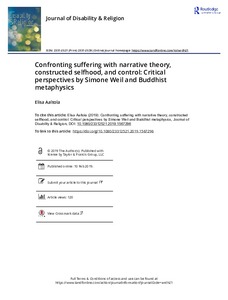Confronting suffering with narrative theory, constructed selfhood, and control: Critical perspectives by Simone Weil and Buddhist metaphysics
Elisa Aaltola
Confronting suffering with narrative theory, constructed selfhood, and control: Critical perspectives by Simone Weil and Buddhist metaphysics
Elisa Aaltola
Taylor & Francis
Julkaisun pysyvä osoite on:
https://urn.fi/URN:NBN:fi-fe2021042825613
https://urn.fi/URN:NBN:fi-fe2021042825613
Tiivistelmä
According to the narrative approach, illness and suffering are disruptions that test our ability to retell and govern ourselves. For instance, Arthur Frank and Rita Charon argue that it is via narratives, “selves,” and control that the challenges of illness and affliction can be met. The author explores this approach in light of Simone Weil’s philosophy and Zen Buddhist thought, both of which question the primacy of selfhood, control, and discourse. Using disability as a case study, the author argues that both Weil and Zen Buddhist philosophy offer a radical alternative to narrative ethics, worthy of further scrutiny.
Kokoelmat
- Rinnakkaistallenteet [29335]
